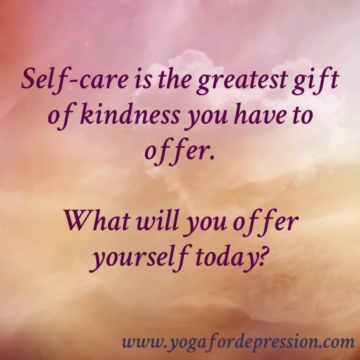This week Rose comes to us from the LifeForce Yoga Trauma Specialist & Self-Care Mastery Program in Tucson. She is joined by a special guest, Jackrabbit!
Self-care is the most important practice that we can engage in. It is how we take care of our soul! As the saying goes, “you cannot fill from an empty cup.” But how do you take care of yourself in a society that tell us self-care is selfish? Let’s put that myth to bed and make a commitment to improving our world by taking care of ourselves first.
 Identify What You Need
Identify What You Need
The first step in self-care is to identify what you need to take care of yourself. We need to connect with ourselves to give ourselves what we need. Soften your eyes, take three deep breaths, and ask yourself the following questions:
- How am I feeling right now?
- How do I want to feel?
- What do I need to feel that way?
- What can I do right now that takes me one step closer to feeling that way?
Don’t worry if some of those questions go unanswered. If we have not taken the time to connect with ourselves in a while, it can be hard to hear that inner voice. Do the best you can and it will come with practice. If no answers came, head to your favorite inspirational book, or video, or music, and take at least the next 10 minutes to immerse yourself in that wisdom. The more you practice asking these questions, the easier the answers will come.
A practice that can help you identify what you need is to Set a Spiritual Intention. Rose leads a twenty minute practice that can help you uncover your spiritual intention here.
Give Yourself What You Need
Now that you have an idea of what you need, it is time to give it to yourself. If you are tired, take a nap, try a yoga nidra practice, go for a walk, meditate, or simply rest. If you have a long stressful day ahead of you, movement can help you have more energy and more clarity, it pumps your cerebral spinal fluid. You don’t need to spend an hour on self-care, five minutes a day is better than zero. As a result of your self-care practice, you will start to feel better and that will lead you to practice more self care. Be unrepentant about your self-care because you deserve it!
Parents put the needs of their children ahead of their own. This is important. But what about teaching children how to honor their own needs? Raise the discussion with them about self-care and that parents need rest time so that parents can engage more with children. A day spent with a grouchy or distracted parent is not as beneficial as three-quarters of a day spent with a parent in a fun and engaged mood.
Set Up Your Self-Care Space
Do you have a special space in your home where you can practice self-care? Some people have a whole room devoted to self-care. Some people have an altar or shelf with special items. Some people prefer an outdoor space. The point is that your self-care space is always there and that you visit it every day. If you don’t have a space, go set one up now. Use items like a candle, incense, a picture, an inspirational book, a yoga mat, a favorite chair, whatever nourishes your heart and soul should go in this space. Just remember to leave space for you!